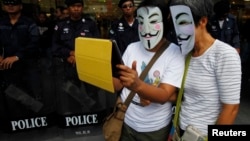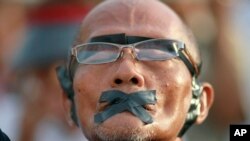BANGKOK —
Less than a week after the country’s military carried out a coup, Thailand’s government announced plans to allow it to more quickly censor content on the Internet.
Two of Thailand’s state-owned telecommunications companies are to oversee a new Internet gateway that gives authorities more control over censoring material online. Thailand already blocks some online content that authorities deem to be offensive, but the new system would give authorities even more control.
The director of the Ministry of Information and Communications Technology’s IT crime prevention bureau, Thanit Prapatanan, tells VOA it will likely be several months before the plan for the new control system is worked out.
Thanit cites the example of China, where he argues that filtering does not have a significant impact on society, rather it just blocks some websites deemed dangerous, but all Internet ports are not closed.
The ministry says some stricter measures have already been implemented for the Internet, as well as social media networks.
Websites blocked
On orders of the military junta, 219 websites have been blocked as threats to national security. And the ministry says it will ask operators of such social media sites as Facebook, Line and YouTube to ban user accounts deemed to be disseminating illegal content under Thailand’s martial law decrees.
Facebook, which is popular in the country, was unavailable for about 90 minutes Wednesday in Thailand. The ministry cited a “gateway error” for the glitch.
The incident generated immediate widespread concern online, prompting a 30-second nationally broadcast statement by a coup spokesman, Colonel Winthai Suvaree.
The colonel says there were “technical problems” with access to Facebook and “it has now been fixed.”
That explanation was not convincing for some social media users who speculated the outage was a trial run for a wider blackout or that it was a message to refrain from criticizing the coup.
Professor Kevin Hewison, the director of the Asia Research Center at Australia’s Murdoch University says the coup leaders may desire to emulate what has been done in other countries, such as Turkey temporarily blacking out Twitter messaging and YouTube videos in March of this year and Egypt almost completely cutting itself off from the Internet in January, 2011.
“I am guessing that the military in Thailand has been watching these kinds of things and kind of wishing and hoping that they could do the same thing," he said. "Some of these flash mobs are being done through phones, but they are also being done through social media like Facebook and Line and so on and, I think, they will try to prevent that taking place.”
The Australian specialist in Thai politics notes that after the previous coup in 2006 the military faced some criticism for not eradicating the influence of the deposed prime minister, Thaksin Shinawatra, a billionaire telecommunications tycoon.
“And I think this military has certainly learned from that. So I am not surprised that we are seeing tougher messages being taken. This military administration could get a lot tougher. And that is where closing down the whole Internet, arresting more people, et cetera is entirely possible if they do not get the cooperation that they are demanding and the order that they are demanding,” he said.
More regulation ahead
The information and communications technology ministry has also announced two entities have been established to more strictly regulate Internet and social media content. The first, run by the police, is to monitor content and block dissemination of any messages deemed to violate the censorship orders issued by the military.
The second group, according to the ministry, will have army representatives working with police to investigate and arrest people disseminating any information deemed illegal.
Due tio its existing strict laws against criticism of Thailand’s royal family, the kingdom, even prior to last Thursday’s coup, was ranked only “partly free” by the independent pro-democracy watchdog organization, Freedom House.
Thailand’s print and broadcast media outlets are under restraints with soldiers inside some television stations. Some journalists have been called in by the military for questioning or detained.
Two reporters who asked the coup chief, General Prayuth Chan-ocha, questions at his only news conference on Monday have been singled out for criticism. The army secretary, Major General Ponlapat Wannapak is quoted saying reporters should be “cheering on” the army chief, who is also now the sole leader of the national administration.
Last week’s coup came after years of political turmoil and recent months of organized demonstrations. The most persistent rallies demanded the removal of the administration of Yingluck Shinawatra, Thaksin’s sister, who became prime minister after the 2011 election.
She was among the 253 people summoned by the coup leaders. The military says 124, including Yingluck, have been released and 53 of those who were asked to turn themselves in are now considered fugitives.
Two of Thailand’s state-owned telecommunications companies are to oversee a new Internet gateway that gives authorities more control over censoring material online. Thailand already blocks some online content that authorities deem to be offensive, but the new system would give authorities even more control.
The director of the Ministry of Information and Communications Technology’s IT crime prevention bureau, Thanit Prapatanan, tells VOA it will likely be several months before the plan for the new control system is worked out.
Thanit cites the example of China, where he argues that filtering does not have a significant impact on society, rather it just blocks some websites deemed dangerous, but all Internet ports are not closed.
The ministry says some stricter measures have already been implemented for the Internet, as well as social media networks.
Websites blocked
On orders of the military junta, 219 websites have been blocked as threats to national security. And the ministry says it will ask operators of such social media sites as Facebook, Line and YouTube to ban user accounts deemed to be disseminating illegal content under Thailand’s martial law decrees.
Facebook, which is popular in the country, was unavailable for about 90 minutes Wednesday in Thailand. The ministry cited a “gateway error” for the glitch.
The incident generated immediate widespread concern online, prompting a 30-second nationally broadcast statement by a coup spokesman, Colonel Winthai Suvaree.
The colonel says there were “technical problems” with access to Facebook and “it has now been fixed.”
That explanation was not convincing for some social media users who speculated the outage was a trial run for a wider blackout or that it was a message to refrain from criticizing the coup.
Professor Kevin Hewison, the director of the Asia Research Center at Australia’s Murdoch University says the coup leaders may desire to emulate what has been done in other countries, such as Turkey temporarily blacking out Twitter messaging and YouTube videos in March of this year and Egypt almost completely cutting itself off from the Internet in January, 2011.
“I am guessing that the military in Thailand has been watching these kinds of things and kind of wishing and hoping that they could do the same thing," he said. "Some of these flash mobs are being done through phones, but they are also being done through social media like Facebook and Line and so on and, I think, they will try to prevent that taking place.”
The Australian specialist in Thai politics notes that after the previous coup in 2006 the military faced some criticism for not eradicating the influence of the deposed prime minister, Thaksin Shinawatra, a billionaire telecommunications tycoon.
“And I think this military has certainly learned from that. So I am not surprised that we are seeing tougher messages being taken. This military administration could get a lot tougher. And that is where closing down the whole Internet, arresting more people, et cetera is entirely possible if they do not get the cooperation that they are demanding and the order that they are demanding,” he said.
More regulation ahead
The information and communications technology ministry has also announced two entities have been established to more strictly regulate Internet and social media content. The first, run by the police, is to monitor content and block dissemination of any messages deemed to violate the censorship orders issued by the military.
The second group, according to the ministry, will have army representatives working with police to investigate and arrest people disseminating any information deemed illegal.
Due tio its existing strict laws against criticism of Thailand’s royal family, the kingdom, even prior to last Thursday’s coup, was ranked only “partly free” by the independent pro-democracy watchdog organization, Freedom House.
Thailand’s print and broadcast media outlets are under restraints with soldiers inside some television stations. Some journalists have been called in by the military for questioning or detained.
Two reporters who asked the coup chief, General Prayuth Chan-ocha, questions at his only news conference on Monday have been singled out for criticism. The army secretary, Major General Ponlapat Wannapak is quoted saying reporters should be “cheering on” the army chief, who is also now the sole leader of the national administration.
Last week’s coup came after years of political turmoil and recent months of organized demonstrations. The most persistent rallies demanded the removal of the administration of Yingluck Shinawatra, Thaksin’s sister, who became prime minister after the 2011 election.
She was among the 253 people summoned by the coup leaders. The military says 124, including Yingluck, have been released and 53 of those who were asked to turn themselves in are now considered fugitives.






